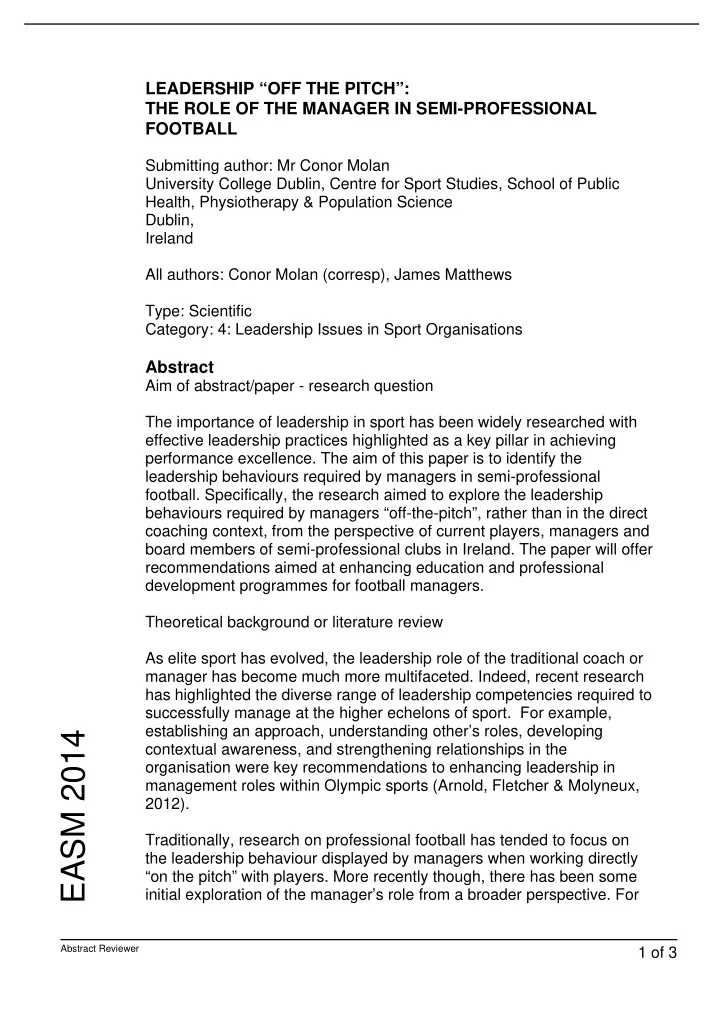

LEADERSHIP “OFF THE PITCH”: � THE ROLE OF THE MANAGER IN SEMI-PROFESSIONAL FOOTBALL Submitting author: Mr Conor Molan University College Dublin, Centre for Sport Studies, School of Public Health, Physiotherapy & Population Science Dublin, Ireland All authors: Conor Molan (corresp), James Matthews Type: Scientific Category: 4: Leadership Issues in Sport Organisations Abstract Aim of abstract/paper - research question � � The importance of leadership in sport has been widely researched with effective leadership practices highlighted as a key pillar in achieving performance excellence. The aim of this paper is to identify the leadership behaviours required by managers in semi-professional football. Specifically, the research aimed to explore the leadership behaviours required by managers “off-the-pitch”, rather than in the direct coaching context, from the perspective of current players, managers and board members of semi-professional clubs in Ireland. The paper will offer recommendations aimed at enhancing education and professional development programmes for football managers.� � Theoretical background or literature review� � As elite sport has evolved, the leadership role of the traditional coach or manager has become much more multifaceted. Indeed, recent research has highlighted the diverse range of leadership competencies required to successfully manage at the higher echelons of sport. For example, establishing an approach, understanding other’s roles, developing EASM 2014 contextual awareness, and strengthening relationships in the organisation were key recommendations to enhancing leadership in management roles within Olympic sports (Arnold, Fletcher & Molyneux, 2012). � � Traditionally, research on professional football has tended to focus on the leadership behaviour displayed by managers when working directly “on the pitch” with players. More recently though, there has been some initial exploration of the manager’s role from a broader perspective. For Abstract Reviewer 1 of 3
example, Potrac and Jones (2009) explored this wider leadership role of the head coach or manager, highlighting how managing the complex social interactions outside the training ground with players, assistants and the board are central to the head coach’s work. Additionally, Kelly (2008) explored the culture surrounding the manager’s role in professional football and revealed a position dominated by traditional forms of authoritarianism and resistance to modern management approaches. Although, these initial insights are promising, this area is still under-researched. For example, there is a paucity of research exploring the manager’s leadership behaviour from different perspectives, such as club chairmen or other board members, despite the influential positions of these stakeholders.� � To support the identification of leadership behaviours used “off-the-pitch” by football managers, transformational leadership and transactional leadership were used as theoretical frameworks for this study. These frameworks were chosen as recent research in the sport domain has highlighted how both transformational leadership behaviours and transactional skills, such as exchanges of communication and detecting mistakes may be beneficial for leaders in facilitating elite sport performance (Callow, Smith, Hardy, Arthur & Hardy, 2009; Rowold, 2006). � � Methodology, research design and data analysis � � Following purposive selection, in depth semi-structured interviews were conducted with eleven participants who have significant first-hand experience of football managers’ performance leadership behaviours (four managers, four players and three board members). The participants represented four of the twelve clubs in the League of Ireland Premier Division, which is currently ranked 43rd out of 53 professional national leagues in Europe. The data was manually transcribed and thematic analysis conducted, with a number of key themes and related leadership behaviours identified. � � Results, discussion and implications/conclusion� � Initial findings from the study indicate that although the manager employs EASM 2014 transformational skills to inspire the team towards his vision of success, ultimately the long term vision for the club is held at board level. Furthermore, effective communication skills and managing relationships upwards with the board are highlighted as important aspects of the manager’s leadership role. The analysis of the results is not fully complete in time for the deadline of this abstract but will be available for presentation in September.� � The findings from this study will extend our knowledge of leadership in the role of the football manager in semi-professional football and Abstract Reviewer 2 of 3
highlight the importance of off-the-pitch leadership behaviours in establishing their position thus allowing them to drive performance. It is argued that managers should be aware of the importance of utilising appropriate leadership behaviours not just directly with their players but with other key stakeholders in the wider club environment. The study will provide contributions for current practice, manager education courses and professional development programmes within national football associations. References Arnold, R., Fletcher, D., & Molyneux, L. (2012). ‘Performance leadership and management in elite sport: recommendations, advice and suggestions from national performance directors’. European Sport Management Quarterly, 12(4), 317-336.� Callow, N., Smith, M. J., Hardy, L., Arthur, C. A., & Hardy, J. (2009) 'Measurement of transformational leadership and its relationship with team cohesion and performance level'. Journal of Applied Sport Psychology, 21(4): 395-412.� Kelly, S. (2008). ‘Understanding the role of the football manager in Britain and Ireland: A Weberian approach’. European Sport Management Quarterly, 8(4), 399-419.� Potrac, P. & Jones, R. L. (2009). 'Micropolitical Workings in Semi- Professional Football'. Sociology of Sport Journal, 26(4): 557-577.� Rowold, J. (2006) 'Transformational and Transactional Leadership in Martial Arts'. Journal of Applied Sport Psychology, 18(4): 312-325. EASM 2014 Abstract Reviewer 3 of 3
Recommend
More recommend